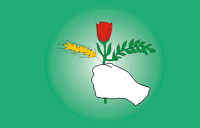Patriotic Union of Kurdistan
| Patriotic Union of Kurdistan یەکێتیی نیشتمانیی کوردستان (kurd.) Yekêtiy Nîştimaniy Kurdistan الاتحاد الوطني الكردستاني (Arabic) al-Itiḥād al-Waṭanī al-Kurdist |
|
|---|---|

|
|
| Party leader | vacant |
| founding | June 1, 1975 |
| Headquarters | Sulaimaniyya |
| Alignment | Center-left : Social Democracy , Democratic Socialism , Kurdish Nationalism |
| Colours) | green |
| Parliament seats | In the Council of Representatives: 17 out of 325 In the Kurdistan Parliament : 29 out of 111 |
| International connections | Socialist International , Progressive Alliance |
| Website | PUKnow |
The Patriotic Union of Kurdistan (PUK; Kurdish یەکێتیی نیشتمانیی کوردستان, Yekêtiy Nîştimaniy Kurdistan ) is a Kurdish party in Iraq . The party forms the opposition to the Democratic Party of Kurdistan .
Over time, the party moved closer and closer to the political center, so that today it represents a program that can be described as social democratic by Western standards .
history
The PUK was founded in 1975 by Jalal Talabani and other Kurdish politicians like Nawschirwan Mustafa , Ibrahim Ahmed and guerrilla leaders like Ali Askari . It emerged from the merger of the “socialist movement” Askaris and the Komala , a circle in the PDK. Its first secretary was Aswar Celal . Talabani and Mustafa pushed back Marxist influence in the new party in favor of the “ Kurdayetî concept”. It was agreed that Talabani would campaign for support for the PUK abroad and that Mustafa would organize the PUK in Iraq.
The party supported Iran in the First Gulf War . The central government of Iraq took revenge for this by using chemical weapons against the Kurdish population of Northern Iraq.
After the first free elections in the Kurdish autonomous region in northern Iraq in 1992, the PUK and the DPK agreed on the same number of mandates. Both parties intended to govern together. In 1993, however, there was a conflict between the two parties in northern Iraq. This culminated in the DPK-PUK conflict in 1994 , as a result of which the PUK Peschmergas occupied the Kurdish regional parliament . The rivalry between the two parties led to the division of the Kurdish regions in northern Iraq in 1994. The north-west of the areas was controlled by the DPK, the south-east was under the influence of the PUK. In 1998 both parties agreed to sign a peace treaty.
The leader of the PUK, Talabani, was instrumental in several unilateral armistices against Turkey declared by the PKK . He took part in press conferences together with Abdullah Öcalan .
To elect a transitional parliament after the Iraq war in 2003, the PUK joined forces with the DPK and other smaller parties to form the Democratic Patriotic Alliance of Kurdistan (also known as the Kurdish Alliance ). The electoral alliance won 25.7% in the election on January 30, 2005 and thus 71 out of a total of 275 seats in the Iraqi National Assembly, which, as a transitional parliament, drafted a new constitution . In the Iraqi government in 2005 , eight members of the Kurdish Alliance were ministers, five of them from the PUK. In the 2010 parliamentary elections , the Kurdish party alliance won 43 out of 325 seats. The PUK does not currently have a minister in Nuri al-Maliki's cabinet .
In the elections of the Kurdish parliament, the PUK faced great competition from the Gorran party , whose chairman was Navschirvan Mustafa until his death in 2017. After several years of sometimes violent conflicts, Gorran and the Patriotic Union of Kurdistan concluded an agreement on May 17, 2016 on political cooperation that enables the formation of alliances in parliament and joint lists in elections.
Since Talabani’s death, Kosrat Rasul Ali has been acting general secretary of the PUK.
Web links
- Website of the Leadership Council (English)
Individual evidence
- ↑ Andrea Fischer-Tahir: "We gave many martyrs". Resistance and collective identity building in Iraqi Kurdistan. Münster 2003, ISBN 978-3-89771-015-3 , p. 71.
- ^ Al-Monitor, Will unity deal deepen rivalries in Iraqi Kurdistan? ( Memento of the original from June 7, 2016 in the Internet Archive ) Info: The archive link was inserted automatically and has not yet been checked. Please check the original and archive link according to the instructions and then remove this notice. May 18, 2016.
- ↑ WATCH: Kosrat Rasul returns to Kurdistan after months of medical treatment in Germany , Karzan Sulaivany, Kurdistan 24, January 6, 2018